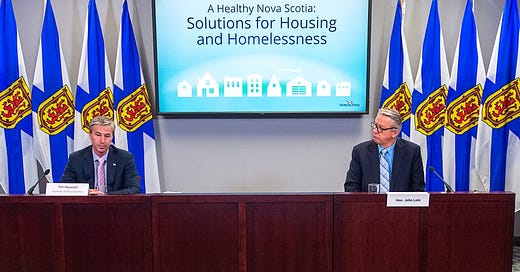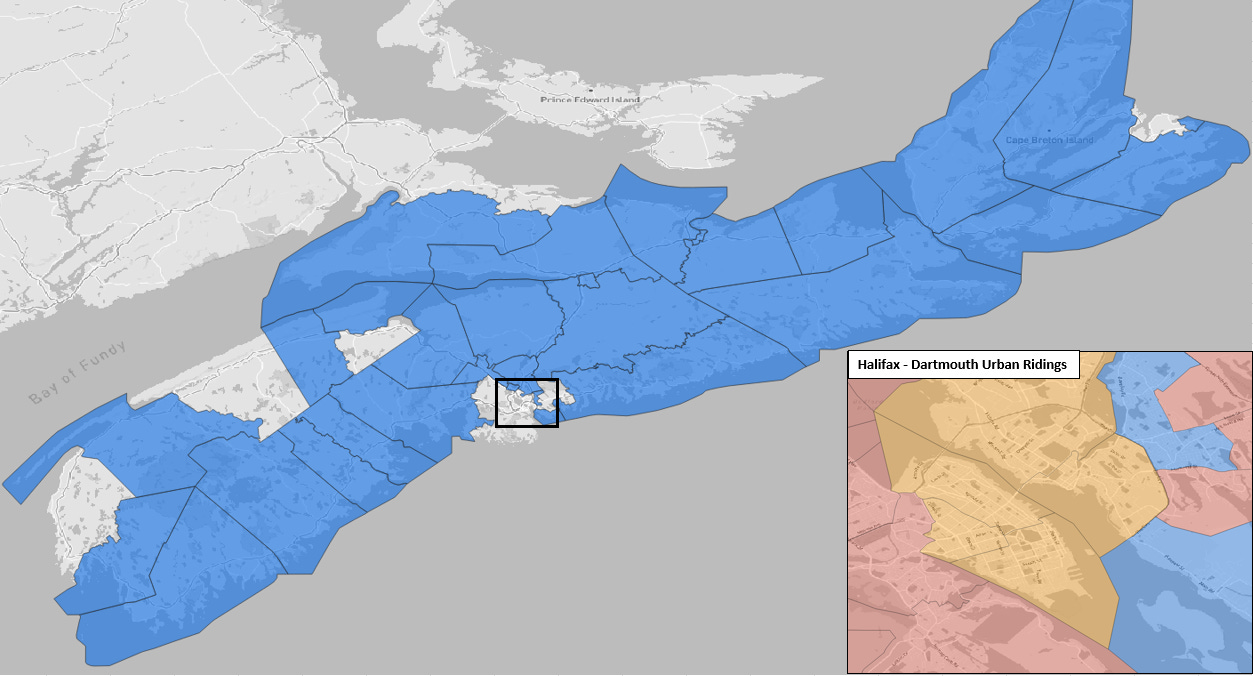Premier Houston Should Legalize Housing in Halifax
As the Premier focuses his dollars on healthcare, he should override HRM's housing blockade, spark a real construction boom, and protect his rural base from sprawl
Nova Scotia’s latest budget, called “More Healthcare, Faster” was released in March. The budget’s focus was on improving healthcare. That’s not too surprising, the ruling PC government was elected on that issue, and seniors worried about healthcare is a more reliable voter base than students and immigrants struggling with rent.
But, the budget makes it very clear that there is no public money for housing. The most relevant is a measly $15 million for repairs of public housing. My rough market valuation of all homes in Nova Scotia using census data is about $140 billion (475 thousand homes at an average value of $300k). Basically, if you aren’t talking billions, you aren’t gonna move the housing market, and the province doesn’t have billions laying around. The federal budget also confirmed it will be enthusiastic in its inaction on housing.
Note: the lack of scale is true across party lines. In 2021, the NDP campaigned on 1,000 public housing units over 4 years, which is only 5% of current construction activity.
Waiting on a plan…
So, while the parties dither, the urgency is building for real action on housing. Nova Scotia added 35,000 people in 2022, smashing all previous records. But it built about the same number of homes as it always does, roughly 5,000. Having 7 folks fight over 1 home is never gonna work well.
Why isn’t housing construction booming? The demand is clear, prices are high, rents are high, that orange line should be rocketing upwards! To simplify, we’ve created all sorts of restrictions on supply, especially legal restrictions in the areas most in demand. In Halifax’s prime neighborhoods, you can only build a single-family home+basement suite (red) or a duplex+suite (orange). This forces all growth into tiny pockets of development, which appear impressive (cranes!), but just aren’t enough to meet demand. Meanwhile, the exclusionary zoned areas can often be de-populating (e.g., the southern edge of the South End - you know, where the street widens and the homes get massive). Our prime neighborhoods, which are walkable, close to jobs, hospitals, and universities, often have a million-dollar entrance fee (the cost to own a single family home).
The bottom line of why is local opposition. Call it NIMBYism, self-interested homevalue voting, or just an innate desire for things to stay the same, it means city council is powerless to overwhelming local opposition. There’s no money for mass public housing, and our private housing stock is constrained by intentionally burdensome rules to prevent new housing.
The Opportunity
Designating vast swaths of cities to be very low-density is common across Canada (excluding Quebec, if you’ve been to Montreal you might have noticed the amount of small apartments everywhere). These neighborhoods, often richer and older (read: more likely to vote), hold self-sustaining political power in city councils.
What’s interesting about Premier Houston, is that his coalition does not have a single member from an urban Halifax riding (for me that’s the peninsula + Dartmouth inside the 111). The NDP hold all those seats, and the PCs got less than 20% of the vote in all of those ridings. The crass reality is that the PCs don’t need to care about voters in those ridings, as long they hold the rural base. That creates unfortunate problems in some policy areas (like balancing highway spending vs. the urgent need for better transit in Halifax). But on housing, this is an opportunity.
The province should pick a fight with Halifax’s urban landhoarders by overriding zoning laws, not a few on specific lots, but across all or most of urban Halifax. It should allow small apartments as-of-right, allow these apartments to cover more of the lot, and cut parking mandates for the apartment dwellers (this will create a homebuilding boom, see Auckland). Homeowners will riot, but why would the PC base in Guysborough county care? Hell, they might like the idea that their son or daughter in the trades can spend the next three decades turning single family homes into small apartments (that they could actually afford to live in!).
The PCs have to do something on housing and putting the NDP into a position where they (will likely) argue against more housing in their (rich) ridings sure seems like a better approach than letting them bang you over the head about fixed-date rent control loopholes. Plus, this costs no public money.
Succeed where others have failed
I really think the rural-urban divide is key here, with Nova Scotia being an abnormally rural population (read more here). In Ontario, Doug Ford had a Housing Task Force recommend a similar route, to override clearly failing municipal rules. But Doug Ford’s caucus faces much more “cross-pressure”. The Ontario PC’s won landslides in many rural areas, but Ontario’s swing seats are always in the GTA. Ford won 12 seats from Toronto proper, and another 24 in the GTA (out of 83 PC wins). Nearly half of his members represent areas that an aggressive “smash the NIMBYs” approach would affect. That explains why the Ontario government is talking more than it is acting.
There are some good case studies south of the border, too. And it’s not just California and New York YIMBY activism. Rural states like Montana and Vermont are considering bills to liberalize housing in their (small) cities.
There is a way to message pro-housing zoning reform to a rural base. From Montana’s Republican Governor: Simple diagnosis, simple solution, with a subtle underlying message (we don’t want sprawl into rural areas):

The (Political) Cost of Inaction
Obviously, letting a housing shortage of this magnitude rage on is a disaster. The province doesn’t set international immigration targets, nor can it restrict folks moving in from Ontario (10,000 net in the past year alone). Something needs to be done.
But to be overly political, as newcomers arrive, and there is not enough housing in Halifax proper, they will increasingly look outwards. They’ll look out as far as needed to be able to afford a home. “Drive till you qualify” has resulted in huge flows from the GTA to far-out towns. Nova Scotia is on the same path.
If you don’t build enough in Halifax, folks will start to look somewhere “close-ish” (an hour is the typical commuting limit, though WFH may stretch that even further). While the PCs represent hold no seats in urban Halifax, they hold 11 seats within an hour’s drive of downtown (as shown in purple in the map below). The PCs should worry about large forced outflows of non-homeowning young people into rural communities. These rural communities are older, overwhelmingly…unaccustomed to change, don’t have the incomes to compete with out-of-province buyers, and will resent the sudden change and packed roads. Meanwhile, the newcomers will likely be young parents in their 20s or 30s, much more likely to vote Liberal or NDP.

Finally, supporting growth in Halifax carries a fraction of the public cost of supporting growth in rural communities. The more yuppies the PCs can pack into little café-filled streets, the less they need to clearcut forests, destroy wetlands, and expand highways (and the more money left over to actually help rural communities’ current residents…PC voters).
Legally Speaking
I’m not a lawyer, but as I understand it, municipalities are a totally made-up entity. They appear nowhere in the constitution, they are basically corporations created by provinces. They are often referred to as “creatures of the province”, because all of their power is simply given to them from the provinces. It’s not trampling democracy for a province to override a municipality on any issue, it’s simply reversing a previous provincial decision to leave the power to the municipality. Not to mention, turnout rates for municipal elections are much lower (40% vs. 55% provincially), they skew older, and many folks cannot identify their local officials or what they stand for. I’d be more sympathetic to city councils if they weren’t so blasé about the huge failures in their most important policy area.









